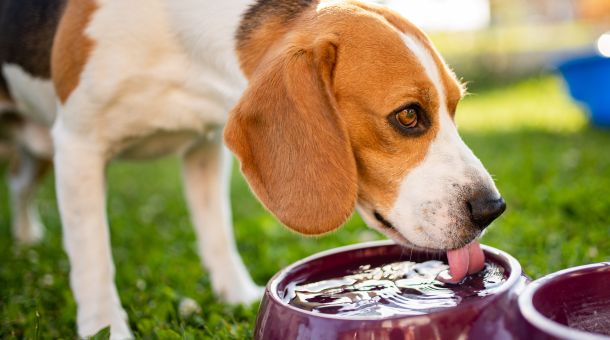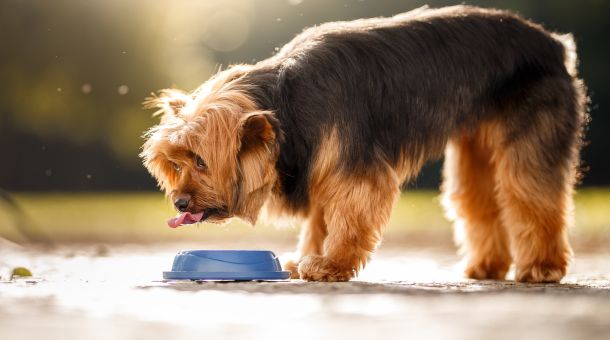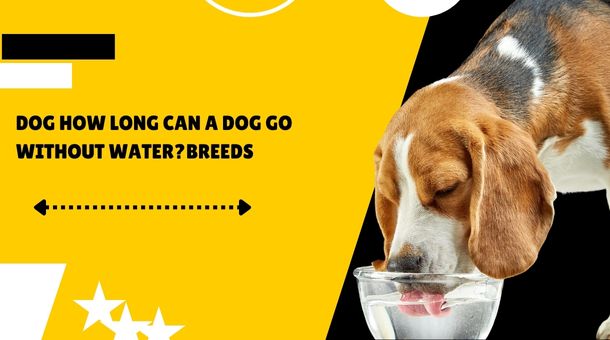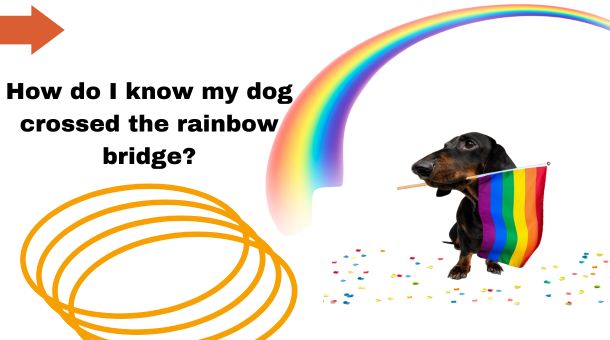How long can a dog go without water? How long can a dog go without water? How long can a dog go without water? How long can a dog go without water?
Dogs need water just as much as humans to maintain health and well-being. But have you ever wondered how long a dog can go without water? It’s an important question for pet owners to understand, especially during hot weather or when traveling.
In this article, we’ll delve into the scientific principles that underpin… dog hydration and provide valuable insights to help you ensure your furry friend stays properly hydrated.
From understanding their physiology to tips on how to keep them hydrated, we’ve got you covered. So let’s dive in and learn how long dogs can go without water.
How long can a dog go without water?
Depending on environmental factors and overall health, dogs can usually survive without water for up to three days. However, it’s crucial to understand that dehydration can occur quickly and be life-threatening for dogs.
Therefore, providing clean drinking water is essential for maintaining your dog’s health and well-being. Age, activity level, and underlying health issues can affect a dog’s ability to go without water.
Therefore, ensuring that your furry friend can always access fresh and clean water is crucial. In hot weather or when traveling, monitoring their water intake and providing enough water to stay hydrated is even more critical.
Why Is It Important for a Dog to Drink Water?

Drinking water is crucial for a dog’s health and well-being. Here are some reasons why:
- To regulate their body temperature, dogs require adequate water, especially in hot weather.
- Water is essential for digestion and helps move food through a dog’s digestive system.
- Water helps transport nutrients to a dog’s cells, providing them with energy and supporting overall health.
- Drinking water helps flush out toxins from a dog’s body, supporting kidney function and overall health.
- If a dog doesn’t drink enough water, it can become dehydrated, leading to serious health problems.
What Factors Impact How Long A Dog Can Go Without Water?
Several factors can impact how long a dog can go without water.
Here are some of the key ones:
- Dogs can quickly become dehydrated in hot and dry environments.
- Active dogs require more water to stay hydrated than inactive dogs.
- Puppies and senior dogs may be more vulnerable to dehydration than adult dogs.
- Dogs with certain health conditions like kidney disease may require more water to stay hydrated.
- Larger dogs may require more water than smaller dogs to maintain hydration.
- Dogs that eat dry food may need more water to stay hydrated than dogs that eat wet food.

What is Dehydration in Dogs?
Dehydration in dogs is a condition that occurs when a dog’s body loses more water than it takes in. When a dog becomes dehydrated, their body doesn’t have enough water to function properly, leading to serious health problems if left untreated.
Some of the common causes of dehydration in dogs include:
- Lack of access to water
- Illness or disease
- Heatstroke or exposure to hot weather
- Increased activity or exercise
- Vomiting or diarrhea
Symptoms of dehydration in dogs can include:
- Dry mouth and nose
- Sunken eyes
- Lethargy or weakness
- Loss of appetite
- Panting
- Dry, sticky gums
- Decreased skin elasticity
If you suspect your dog is dehydrated, it’s essential to provide them with water immediately and contact your veterinarian. Severe dehydration can be life-threatening, so prompt treatment is crucial.
How Does Dehydration Affect Dogs?
Dehydration can have serious consequences for a dog’s health and well-being. Here are some ways dehydration can affect dogs:
- Decreased energy and lethargy
- Organ damage, including the kidneys, liver, and brain
- Digestive problems such as constipation, bloating, and stomach cramps
- Increased risk of heatstroke, a life-threatening condition
- Increased susceptibility to urinary tract infections
- Shock and collapse in severe cases, which can be life-threatening
It’s crucial to always provide your dog with enough clean and fresh water to prevent dehydration and ensure their health and well-being.
How To Prevent Dehydration in Dogs?
Preventing dehydration in dogs is essential to ensure their health and well-being. Here are some tips to help prevent dehydration in dogs:
- Provide clean and fresh water: Ensure your dog has access to clean and fresh water. Change the water in their bowl regularly and wash it daily to prevent bacteria buildup.
- Monitor water intake: Monitor how much water your dog drinks daily, especially during hot weather or increased activity. If your dog isn’t drinking enough water, encourage them to drink more or talk to your veterinarian.
- Offer wet food: Wet food contains more moisture than dry food, which can help keep your dog hydrated.
- Limit exercise in hot weather: Avoid exercising your dog during the hottest parts of the day or in hot weather. When you do exercise them, make sure to bring water and take frequent breaks.
- Provide shade and cool areas: Make sure your dog has access to shade and cool areas to rest, especially during hot weather.
- Add water to kibble: Add water to your dog’s dry food to increase their water intake.
- Your dog has a health condition that increases its risk of dehydration, talk to your veterinarian about how to prevent dehydration and ensure its overall health and well-being.
What Causes Dehydration in Dogs?
Dehydration in dogs can be caused by several factors, including:
- Inadequate water intake: It can dehydrate if dogs don’t drink enough water. This can happen if their water bowl is empty or if they don’t have access to water.
- Excessive panting: Dogs pant to cool themselves down, but excessive panting can cause them to lose too much water and become dehydrated.
- Diarrhea and vomiting: If a dog has diarrhea or vomiting, it can lose a significant amount of fluids, leading to dehydration.
- Heatstroke: Dogs can develop heatstroke when their body temperature rises to dangerous levels, causing dehydration and other health problems.
- Illness or disease: Certain illnesses or diseases can cause dehydration in dogs, such as kidney disease, diabetes, or cancer.
- Medications: Some medications can cause dogs to urinate more frequently, leading to dehydration.
It’s essential to be aware of the causes of dehydration in dogs and take steps to prevent it. Providing your furry friend with clean and fresh water at all times, monitoring their water intake, and seeking veterinary care can help prevent dehydration and ensure their overall health and well-being.
What to Do If Your Dog is Dehydrated?
If you suspect your dog is dehydrated, taking action promptly is essential. Here are some steps you can take if your dog is dehydrated:
- Offer your dog small amounts of water frequently. Don’t let them drink too much water simultaneously, which can cause vomiting.
- Some dogs may prefer to lick ice cubes instead of drinking water.
- You can purchase electrolyte solutions made for dogs from pet stores or your veterinarian. These solutions can help replace lost fluids and minerals.
- Wet food contains more moisture than dry food and can help rehydrate your dog.
- If your dog is severely dehydrated, you should immediately contact your veterinarian. They may recommend administering fluids through an IV or subcutaneous fluids.
- Keep an eye on your dog’s symptoms and overall condition. If their condition doesn’t improve or worsens, seek veterinary care immediately.
Preventing dehydration is crucial to ensure your dog’s health and well-being. Ensure your furry friend has access to clean and fresh water, monitor their water intake, and seek veterinary care when necessary. By taking these steps, you can help prevent dehydration and ensure your dog stays healthy and happy.
How Long Can Puppies Last Without Water?
Puppies, like adult dogs, need access to water at all times to prevent dehydration. However, young puppies have smaller bodies and are more vulnerable to dehydration than adult dogs.
As a general rule, puppies can last without water for no more than a few hours, depending on their age and activity level.
Newborn puppies obtain most of their hydration from their mother’s milk, so they don’t need access to water until they start weaning. Puppies that are 4-6 weeks old and are in the process of being weaned should have access to clean and fresh water at all times.
Monitoring your puppy’s water intake and refilling their water bowl frequently is essential. Puppies that are more active or live in hotter climates may require more water than others.
If you notice your puppy is not drinking enough water or showing signs of dehydration, seek veterinary care immediately.
Dehydration can have serious consequences for young puppies, leading to health problems, including organ failure and death.
Tips to Encourage Your Dog To Drink Water:
Here are some tips to encourage your dog to drink water:
- Provide fresh and clean water: Ensure your dog has access to fresh and clean water at all times. Change the water in their bowl frequently, and consider using a pet fountain to keep the water circulating and fresh.
- Add a flavor: Some dogs may be more likely to drink water if it has a flavor. You can add a small amount of low-sodium chicken or beef broth to their water bowl to make it more appealing.
- Keep water cool: Dogs may be less likely to drink warm or hot water. Keep their water bowl in a cool and shaded area, or consider adding a few ice cubes to their water bowl.
- Use a wide and shallow water bowl: Some dogs may hesitate to drink from deep and narrow water bowls. Consider using a wider and shallower water bowl that your dog can access.
- Offer water-rich foods: Some fruits and vegetables, such as watermelon, cucumber, and spinach, have a high water content and can help keep your dog hydrated.
- Make water breaks part of your routine: Encourage your dog to take water breaks throughout the day. Consider taking a break during walks or playtime to offer your dog water.
conclusion
water is vital for your dog’s health and well-being. Dehydration can lead to serious health problems and even be fatal if left untreated. As a responsible pet owner, it’s essential to ensure that your dog has access to clean and fresh water at all times, monitor their water intake, and seek veterinary care if necessary.
Following the tips in this article can help prevent dehydration and ensure your dog stays healthy and happy. Remember to be proactive and attentive to your dog’s needs, and if you notice any signs of dehydration, take immediate action to address the issue. With proper care and attention, you can help your furry friend stay hydrated and enjoy a long and healthy life.
How long can a dog go without water? How long can a dog go without water? How long can a dog go without water? How long can a dog go without water? How long can a dog go without water? How long can a dog go without water? How long can a dog go without water?




